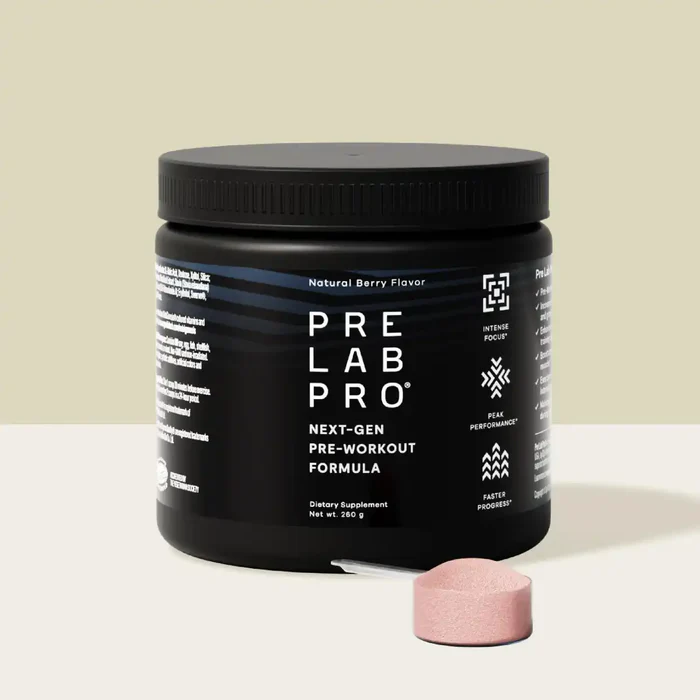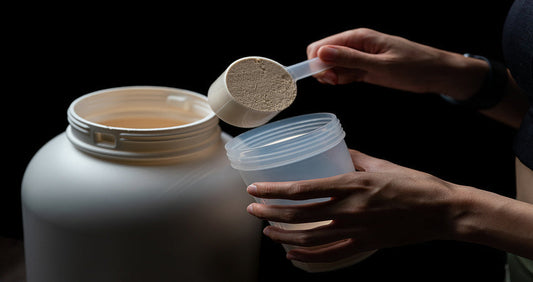The practice of fasting has been around for centuries, but it’s only recently popped up in the health and wellness world as an easy and effective way to reboot your body.
From weight loss and fat loss to better insulin control, better heart health, and mental clarity, the benefits seem to be endless.
But one of the big things where intermittent fasting is concerned is what you can consume during your fasting hours. For some methods, you’re free to drink any calorie-free beverages, while for others, it’s a strict water-only policy.
And when you add training in a fasted state on top of that, it gets even more confusing. What can you take that will keep you in a fasted state but also boost performance?
It gets a bit overwhelming, to say the least…
So, if you’re looking to reap the benefits of fasting, but you’re not looking to blow your fast by popping back a scoop of pre-workout or a handful of pills, you’re in the right place. We’re talking the key things you need to know about fasting and supplements.
Key Takeaways
- Whether a pre-workout breaks a fast depends on its ingredients: calories, carbs, sugars or insulin-triggering additives will, but many clean formulas don’t.
- Pre-workouts that skip sugars, carbs and heavy stimulants and focus on non-glucose pathways (e.g., nitric oxide, amino acid buffers) are more fast-friendly.
- To keep your fast intact while training, pick pre-workouts with minimal calorie load, no hidden proprietary blends containing sugar, and ingredients known not to raise insulin significantly.
- Even if a formula is technically fast-friendly, your individual response matters: hydration, electrolyte status, training intensity and overall diet context still influence outcomes.
- Using a clean option lets you maintain the metabolic benefits of fasting (fat-burning, insulin sensitivity) while still supporting workout performance.

What Is Fasting?
Fasting is an age-old practice that’s been happening for centuries. But while our ancestors likely engaged in fasts for extended periods, modern-day fasts are a bit more short-lived; we call it ‘intermittent fasting.’
Intermittent fasting is voluntary abstaining from food and/or drink for a certain number of hours within a 24-hour period. The method of fasting you choose may be dictated by your goals or schedule, with some of the most popular routes being1:
- Complete alternate-day fasting: Involves alternating fasting days (no energy-containing foods or beverages can be consumed) with normal eating days
- Modified fasting: Allows for consumption of 20–25% of energy needs on scheduled fasting days (usually around 500 calories); this is the basis for the 5:2 diet, where you fast completely on two non-consecutive days and eat normally the other five days
- Time-restricting feeding: The most popular method of fasting, also referred to as intermittent fasting, whereby you consume your daily energy intake within a specific time window; for example, you have an eating window of 10 am to 6 pm, and you fast all hours outside of that
Time-restricted feeding is by far the most popular form of fasting done because it’s easy to fit into most schedules, and there’s a good amount of research backing the efficacy of intermittent fasting in terms of health benefits.
In rodent models, time-restricted feeding has been associated with reductions in body weight, total cholesterol levels, triglycerides, glucose, insulin, interleukin-6 (IL-6), and TNF-α, along with improvements in insulin sensitivity1.
The reason it’s so powerful is because the body functions very differently in a fed state than it does in a fasted state. So when you abstain from food intake, the body switches on some fundamental processes required to maintain health and longevity.
Let’s see why fasting should be a regular part of most people’s routine.
The Benefits Of Fasting
#1 Alters function of hormones, cells, and genes - It may seem like not eating isn’t a big deal, but when you refrain from food, a lot happens internally. Some of the major changes that occur include2-5:
- Insulin levels decrease significantly during fasting, which helps to improve insulin sensitivity but also encourage your body to tap into fat stores for energy (high insulin prevents fat burn)
- Levels of human growth hormone (HGH) increase, which helps to facilitate fat burning and muscle growth, among other benefits
- Fasting up-regulates major cellular repair processes, including waste removal and old protein degradation
- Genes coding for longevity and protection against disease development are turned ON during periods of fasting
#2 Autophagy - Autophagy is one of the major processes that is turned on during fasting; it is essentially the “cellular clean up crew” that comes in and degrades any dead, old, worn out, or dysfunctional cellular components6. The breakdown of these products is put towards cellular metabolism and used to generate energy and to build new proteins and membranes.
#3 Improved metabolic markers - Whether you struggle with high cholesterol, triglycerides, insulin resistance, inflammation and oxidative stress, or other metabolic and lipid dysfunction, fasting can help. Studies consistently show that fasting can be beneficial for cardiovascular health markers7.
#4 Weight loss - Obesity is one of the most prevalent health conditions worldwide, and fasting shows promise as an effective treatment. Studies find that most of the weight that comes off with fasting is actually fat, which significantly benefits long-term health8. Not to mention the fact that people tend to consume less when fasting due to a decreased eating window and the inability to “graze” throughout the day.
#5 Less inflammation - Inflammation is a huge issue when it comes to chronic disease development and is at the root of several conditions, but regular periods of fasting have been shown to limit inflammation and attenuate pro-inflammatory cytokines and immune cells, which may be the result of altering fuel substrates to improve metabolic efficiency and reduce oxidative stress9.
This is by no means an exhaustive list of the benefits associated with fasting, but you get the point—simply changing your eating schedule can have a profound impact on your health and quality of life.
What Can You Consume While Fasting
In terms of what you can eat during a fast, it’s pretty simple—nothing. Fasting literally means you are abstaining from all food intake, whether that’s food in solid or liquid form.
However, where the blurry line comes into play is between beverages and supplements. Some people will tell you that you can drink anything that is calorie-free (coffee, tea, carbonated waters, sugar-free drinks, etc.), but the extent to which you practice that depends on what you’re willing to put in your body that’s calorie-free.
Just because there’s no energy value attached to it does not mean you should be consuming it, so if you’re doing a fast that is not a water-only fast, the only things you should drink are:
- Water (plain or carbonated)
- Black tea or coffee
Nothing less, nothing more. You want to make sure you’re hydrated, so adding a bit of sea salt to your water can help ensure you’re not losing fluids and diving into electrolyte imbalance territory.
Related Post: Does Prebiotic Fiber Break a Fast? - A Complete Guide
Will Supplements Break A Fast?
This is a biggie where fasting is concerned. Powders, capsules, tablets… will they break a fast, or are they safe to consume?
The line here is a bit blurry because it depends on what you’re consuming. Things like vitamins and minerals are safe all around, but when you get into things like protein powders (they have a caloric value), amino acids (BCAAs), and the like, the debate gets bigger.
Some of the supplements that are not advised to consume during a fast are:
- Omega-3s (algae oil, fish oil, cod liver oil) — These guys are pure fat, so you have to be careful about how much you’re taking. A few grams is safe, but once you hit the tablespoon mark (15g) or more, you’re treading into risky ground.
- Multivitamin — A multi doesn’t contain any caloric value, but keep in mind that some nutrients in them are best absorbed with food, so taking it on an empty stomach isn’t ideal.
- Protein powder — This is a 100% yes to avoid. Not only does it have calories attached to it, but any sort of “whole foods supplement” will definitely break your fast. Save that for within your eating window. The same goes for any supplements containing collagen.
- BCAAs — A lot of people consume amino acids before training in a fasted state, but technically amino acids trigger an insulin response and therefore stop both autophagy and your fast10. With that said, many people recommend taking BCAAs before fasted training to prevent muscle breakdown and improve the post-workout anabolic response, however, something like HMB would be a better fit for maintaining muscle mass without losing the fasted state.
- Anything with sugar — Real or fake, sugar can trigger insulin release and break your fast. Avoid it at all costs.
And for anyone looking to knock back a pre-workout during a fast, let's talk about it.
Can you take pre workout on an empty stomach?
If you’re taking a pre-workout that contains anything we mentioned above, chances are it will trigger an insulin response, and you’ll break your fast.
However, if it’s devoid of anything that may elicit an insulin response, autophagy will progress, and you’ll remain in a fasted state.
Long story short, any supplement that has a caloric value or contains sugar or carbs (watch for hidden sources) is going to break your fast because it triggers an insulin response.
However, with Pre Lab Pro®, you can leave those concerns behind. While it does contain erythritol, studies show that consumption does not affect blood glucose or insulin levels11.
Final Thoughts
Fasting in and of itself can be a challenge, but when you throw training and supplementation into the mix, it takes challenging to a whole new level. And while some supplements can definitely kick you out of a fasting state, most pre-workout supplements won’t.
More specifically, Pre Lab Pro® is a powerful low-caffeine content pre-workout formula that gets the green light when fasting. It will drive athletic intensity like no other formula on the market whether you’re in a fed or fasted state, so go on, knock back a scoop (or two), and get to work.
References
- RE Patterson, GA Laughlin, AZ LaCroix, et al. Intermittent Fasting and Human Metabolic Health. J Acad Nutr Diet. 2015;115(8):1203-1212.
- KK Hoddy, C Gibbons, CM Kroeger, et al. Changes in hunger and fullness in relation to gut peptides before and after 8 weeks of alternate day fasting. Clin Nutr. 2016;35(6):1380-1385.
- KY Ho, JD Veldhuis, ML Johnson, et al. Fasting enhances growth hormone secretion and amplifies the complex rhythms of growth hormone secretion in man.J Clin Invest. 1988;81(4):968-975.
- M Bagherniya, AE Butler, GE Barreto, A Sahebkar. The effect of fasting or calorie restriction on autophagy induction: A review of the literature.Ageing Res Rev. 2018;47:183-197.
- RE Patterson, DD Sears. Metabolic Effects of Intermittent Fasting.Annu Rev Nutr. 2017;37:371-393.
- JD Rabinowitz, E White. Autophagy and metabolism. 2010;330(6009):1344-1348.
- TA Dong, PB Sandesara, DS Dhindsa, et al. Intermittent Fasting: A Heart Healthy Dietary Pattern? Am J Med. 2020;133(8):901-907.
- S Welton, R Minty, T O'Driscoll, et al. Intermittent fasting and weight loss: Systematic review. Can Fam Physician. 2020;66(2):117-125.
- SM Aly. Role of intermittent fasting on improving health and reducing diseases. Int J Health Sci (Qassim). 2014;8(3):V-VI.
- MS Yoon. The Emerging Role of Branched-Chain Amino Acids in Insulin Resistance and Metabolism. Nutrients. 2016;8(7):405.
- K Noda, K Nakayama, T Oku. Serum glucose and insulin levels and erythritol balance after oral administration of erythritol in healthy subjects. Eur J Clin Nutr. 1994;48(4):286-292.















